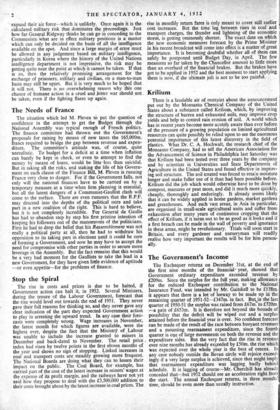The Government's Income
The Exchequer returns on December 31st, at the end of the first nine months of the financial• year, showed that Government ordinary expenditure exceeded revenue by £209m. Since the surplus for the full year, making allowance for the reduced Exchequer contribution to the National Insurance Fund, was intended by Mr. Gaitskell to be £138m. it appears that there is a lot of leeway to be made up in the remaining quarter of 1951-52—£347m. in fact. But.in the last quarter of 1950-51 the surplus was raised from £67m. to £720m. —a gain of £653m. It is therefore not beyond the bounds of possibility that the deficit will be wiped out and a surplus attained before the financial year is over. No confident forecast can be made of the result of the race between buoyant revenues and a mounting rearmament expenditure, since the fourth quarter is ope of large movements on both the revenue and the expenditure sides. But the very fact that the rise in revenue over nine months has already exceeded by £50m. the rise which was expected over the whole year is the best of omens. In any case nobody outside the Bevan circle will rejoice exceed- ingly if a very large surplus is achieved, since that might imply that rearmament expenditure was lagging badly behind schedule. It is lagging of course—Mr. Churchill has already conceded that—but 1952 should see an acceleration right from the start. The annual Exchequer returns, in three months' time, should be even more than usually instructive.






































 Previous page
Previous page